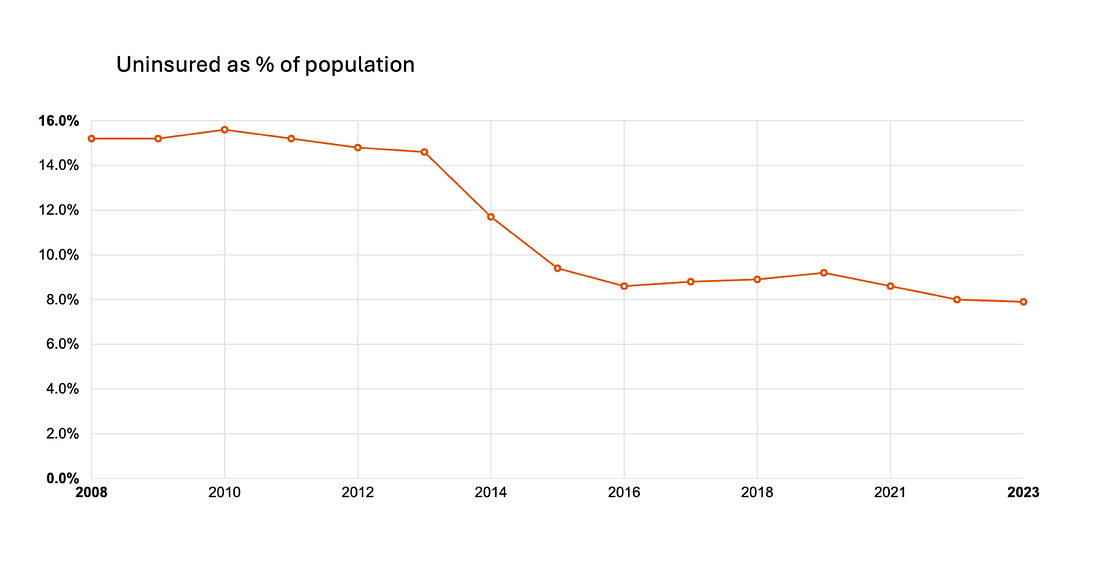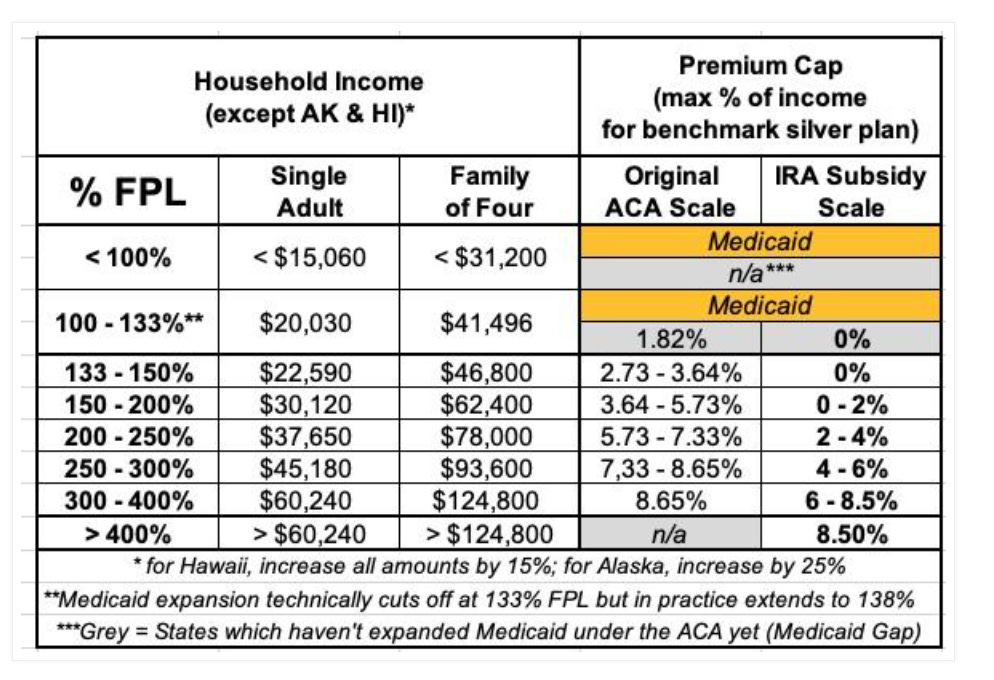Article by Paul Krugman - 29 September - 2025
Why health insurance is about to become unaffordable
"I’m writing this quickly, because of travel: If all goes well, I’ll be somewhere over the Atlantic when this post goes up. But I thought I’d write something about what Democrats are demanding as their price for avoiding a federal government shutdown, why I think that’s the right issue, and why Republicans probably won’t agree.
Even though the Affordable Care Act, aka Obamacare, has been in effect for more than a decade, I’m not sure how many people understand how it works. So let’s review the basics.
The ACA rests on two legs. It was supposed to be three, but Republicans sawed off one of them, the requirement that you buy insurance or face a penalty. But it has still done a lot of good. By the end of the Biden administration, the percentage of Americans without health insurance was lower than it has ever been:
Source: KFF
Part of this improvement was due to an expansion of Medicaid — which will face savage cuts under the One Big Beautiful Bill, but not until after the midterms. However, the other main piece of the ACA, subsidized insurance plans offered on government-run exchanges, will take a body blow in a few months unless Republicans do something totally uncharacteristic — provide help to Americans who need it.
The way the ACA works is that insurance companies are prohibited from discriminating based on medical history — they have to offer the same plans, at the same prices, to healthy people and less healthy people. They can’t charge you more if you have a preexisting condition. The goal of that prohibition is to make sure that health care is available and affordable to those who need it most.
However, just prohibiting discrimination based on medical history works very badly unless backed by additional measures — states that have tried it know this from bitter experience. If everyone pays the same premiums, people who are currently healthy tend not to buy policies, so that insurers face a bad risk pool. This means high premiums, which leads to even more healthy people dropping out, which makes the risk pool even worse. So you end up with a “death spiral” in which very few people buy insurance unless they get it through their employer.
The ACA, however, coupled the prohibition on discrimination with subsidies that cap premiums at a certain percentage of your income (on a sliding scale that depends on how high your income is.) These subsidies make it possible for lower-income Americans to afford insurance. They also, crucially, encourage healthy people to stay in the market, holding overall premiums down. As I said, there was also supposed to be a penalty for going uninsured. But even without that penalty, the system turns out to mostly work.
The original, 2010 version of the ACA was, however, underpowered. The subsidies were too small, and they cut off suddenly for people whose income rose above a relatively low threshold (400 percent of the poverty line.)
What the Biden administration did was to make the subsidies more generous and also end the cutoff. The invaluable Charles Gaba has a table showing the differences:
Source: Charles Gaba
In this table, “% FPL” means income as a percentage of the federal poverty line. The two right columns show the caps on premiums net of subsidies under the original ACA and under the enhanced version introduced by Biden’s Inflation Reduction Act.
Now comes the key point: Biden had very limited political room for maneuver, since he only had 50 Senators and couldn’t afford to lose a single vote. So he was constrained by the most conservative Democrats — basically Joe Manchin — and while they were willing to expand the ACA subsidies, they did so only on a temporary basis, extending through 2025.
Now the enhanced subsidies are about to expire, and the financial hit to many Americans will be apocalyptic. Gaba estimates what will happen to the insurance premiums net of subsidy for different groups in different states. Here, for example, is what will happen in Ohio:
Many people will face huge increases in their insurance costs. And these increases will be magnified by the effects on the risk pool: some healthy people will be dropping out, raising premiums for those who remain.
In other words, millions of Americans will soon be screaming about unaffordable health care.
In a way, I’m surprised that Republicans didn’t decide to keep the enhanced, Biden subsidies in place for another year, just to delay the pain until after the midterms. But they didn’t, probably because they have such a strong aversion to helping Americans in need that they couldn’t even bring themselves to play cynical politics on the issue.
This aversion to doing anything decent is why the government will probably shut down Wednesday. For Republicans need Democratic votes to keep the government open, and Democrats have made retaining enhanced subsidies their price for cooperating.
What will happen then? I have no idea. But I think the Democrats made the right choice when they made health insurance premiums — rather than, say, tariffs — their key demand.
Why? Because doing so puts the onus for rising premiums squarely where it belongs — on Republicans. If Democrats weren’t putting this issue front and center, the usual suspects might be able to convince many voters that someone else — immigrants, Antifa, George Soros, whatever — was responsible for their soaring health costs. That will be much harder now.
Again, I have no idea how this will play out. But it looks to me as if Democrats have chosen good ground on which to make their stand.







